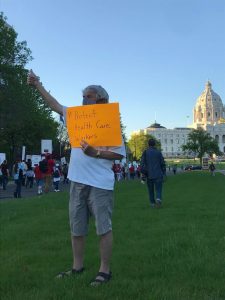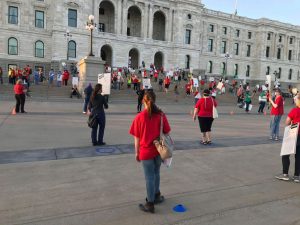Minnesota Nurses March at State Capitol, Demand More PPE
Minnesota Nurses March
“Unfair” and “unsafe” are what Minnesota nurses are calling their work environment amid the global pandemic.
Across the state, health care facilities are facing a shortage of personal protective equipment (PPE). On Wednesday, members of the Minnesota Nurses Association (MNA) marched from United Hospital in St. Paul to the state Capitol to make their voices heard.

Nurses protest at state Capitol.
Members of MNA say there aren’t enough PPE and nurses aren’t even allowed to wear hospital-provided scrubs. Leif Thorsgaard, a registered nurse at United Hospital, said they have to reuse masks and gowns and rely on ineffective substitutes like trash bags. Similar complaints have been heard from nurses at North Memorial Health Hospital in Robbinsdale.
“It got to the point where they started doing reprimands and firing people so now I’m cutting a garbage bag because I don’t want to lose my job because I want to take care of the people in which I serve,” Thorsgaard said.
Some of those who stood up to management at United Hospital, like Monica Norberg, stated they were fired.
“I made them aware that their current stroke education policy was actually violating the stay-at-home order,” Norberg explained. “I told them that maybe we should be doing this from home since its virtual education and we have the capacity to do it.”
Thorsgaard believe hospitals and the state are more concerned about saving costs, rather than those who care for Minnesotans. 
“Instead of ramping up into high gear and adding more protection, they all got together and lobbied to decrease the amount of protection available,” Thorsgaard believes.
Earlier this month, Gov. Tim Walz ordered for non-essential or elective procedures to resume. MNA opposed this executive order arguing that there are not enough PPE for nonessential surgeries, putting health care workers at risk.
The union will deliver a petition with more than 10,000 signatures to demand the highest standards of safety and protection for patients and health care providers.
“If we’re protected as the nurses and the direct care staff then our patients will be protected. Our community will be protected and we could potentially contain this,” said Norberg.


